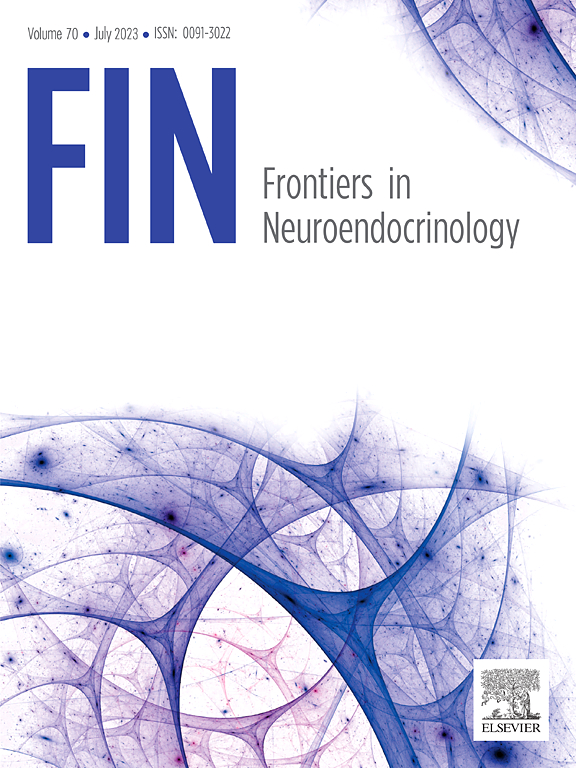雌激素和人脑网络:结构和功能神经影像学研究的系统回顾。
IF 6.7
1区 医学
Q1 ENDOCRINOLOGY & METABOLISM
引用次数: 0
摘要
在月经周期、青春期、产后或绝经过渡期,雌激素的波动与认知、情感和行为影响有关。此外,雌激素在激素避孕、更年期激素治疗或性别确认激素治疗中是必不可少的。本文系统综述了雌激素在人脑网络结构、功能和连接中的作用。我们检索了PubMed、Web of Science和ScienceDirect,检索了自2008年以来发表的评估雌激素的神经影像学文章。我们纳入了54项内源性雌激素研究(N = 2494名受试者)和28项外源性雌激素研究(N = 1740名受试者)。据报道,雌激素相关的变化发生在情绪、奖励、记忆和静息状态网络,以及区域白质和灰质中,海马和杏仁核中具有特殊的神经可塑性。通过检查研究设计、成像测量和分析方法,本综述强调了神经成像在推进神经内分泌和神经认知研究中的作用,特别是促进女性和卵巢患者的大脑健康。本文章由计算机程序翻译,如有差异,请以英文原文为准。
“Estrogens and human brain networks: A systematic review of structural and functional neuroimaging studies”
Estrogen fluctuations during the menstrual cycle, puberty, postpartum, or in the menopausal transition are associated with cognitive, affective, and behavioral effects. Additionally, estrogens are essential in hormonal contraception, menopausal hormone therapy, or gender-affirming hormone therapy. This systematic review summarizes findings on the role of estrogens for structure, function, and connectivity of human brain networks. We searched PubMed, Web of Science, and ScienceDirect for neuroimaging articles assessing estrogens published since 2008. We included 54 studies (N = 2,494 participants) on endogenous estrogen, and 28 studies (N = 1,740 participants) on exogenous estrogen conditions. Estrogen-related changes were reported for emotion, reward, memory, and resting-state networks, and in regional white and gray matter, with a particular neural plasticity in the hippocampus and amygdala. By examining study designs, imaging measures, and analysis methods, this review highlights the role of neuroimaging in advancing neuroendocrine and neurocognitive research, particularly promoting brain health for women and individuals with ovaries.
求助全文
通过发布文献求助,成功后即可免费获取论文全文。
去求助
来源期刊

Frontiers in Neuroendocrinology
医学-内分泌学与代谢
CiteScore
13.30
自引率
6.80%
发文量
62
审稿时长
68 days
期刊介绍:
Frontiers in Neuroendocrinology (FIN) publishes a wide range of informative articles including comprehensive reviews, systematic reviews, opinion pieces, and meta-analyses. While the majority of reviews are invited, we also embrace unsolicited reviews and meta-analyses, as well as proposals for thematic special issues, provided they meet our rigorous quality standards. In addition, we encourage authors to submit commentaries that concisely present fresh ideas or offer further analysis to delve deeper into the implications of an article published in our journal.
 求助内容:
求助内容: 应助结果提醒方式:
应助结果提醒方式:


